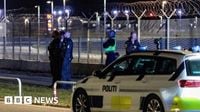Airports in Copenhagen and Oslo were thrust into chaos on the evening of September 22, 2025, as sightings of unidentified drones forced both facilities to close for several hours, disrupting travel for tens of thousands and raising fresh concerns over the security of Europe’s critical infrastructure. The incident, which unfolded amid already heightened tensions in the region, has left authorities scrambling for answers and passengers wondering what comes next.
According to Danish police, the first reports emerged around 8:30 p.m. local time when three or four large drones were observed near Copenhagen Airport’s secure area. "The airspace above Copenhagen Airport has been closed since 8:30 p.m. due to the presence of two or three unidentified drones. No aircraft can take off or land at the airport," airport spokesperson Lise Agerley Kurstein told reporters, as cited by Anadolu Agency. The drones, officials said, appeared to be coming from different directions, making it difficult to pinpoint their origin or intended targets.
The closure at Copenhagen lasted for roughly four hours, with the airport reopening around 1:30 a.m. local time on September 23. Meanwhile, Oslo Airport in Norway followed suit, shutting its airspace after two separate drone sightings were reported near the facility. Monica Fasting, a spokeswoman for Oslo Airport, confirmed, "We have made two separate drone sightings," and said the airport reopened at 3:15 a.m. local time. In total, Oslo’s closure also spanned about four hours, with operations resuming as dawn approached.
The impact was immediate and severe. At Copenhagen Airport alone, nearly 20,000 passengers saw their travel plans upended, with at least 31 flights diverted and another 100 canceled, according to airport management. The popular flight tracking service Flightradar24 reported that at least 35 flights were rerouted while the Danish capital’s airport was closed. Departing services faced long delays and cancellations, and both airports warned of continued disruptions as schedules normalized throughout Tuesday.
Authorities in Denmark and Norway have launched a joint investigation into the incidents, working closely with military and intelligence services to determine the drones’ origin. Deputy Police Inspector Jakob Hansen explained, "At this stage, we do not know" if the drones could be linked to Russia, as quoted by Anadolu Agency. The Danish police have not determined the exact number of drones, nor do they know where they came from or where they are now, but said they would implement a series of measures during the investigation. The specifics of these measures remain undisclosed for security reasons.
While no injuries or physical damage were reported at either airport, the temporary closures highlighted a significant vulnerability in aviation security. Analysts and officials alike have noted the growing challenge posed by drones near airports and other strategic sites. As BBC reported, the incident comes only days after cyberattacks targeted several European airports, further fueling fears of coordinated attempts to destabilize the continent’s transport networks.
Danish Prime Minister Mette Frederiksen did not mince words about the gravity of the situation. In an interview with Danish broadcaster TV2, she declared, "I consider this a serious attack on Denmark’s critical infrastructure… There should be no doubt that the use of drones at the airport can have very serious consequences." She went on to describe the event as "the most serious attack on Denmark’s critical infrastructure to date," underscoring the unprecedented nature of the disruption.
Frederiksen also hinted at possible Russian involvement, noting a pattern of hostile activities in the region, including drone flights in Poland and Romania, violations of Estonian airspace, and hacker attacks on European airports. While she stopped short of a direct accusation, she stated, "In any case, I cannot deny in any way that it was Russia." The Danish intelligence service (PET) echoed these concerns, with operations director Flemming Drejer warning, "We are facing a significant sabotage threat in Denmark. They may not be coming to attack us, but to stress us and see how we react."
The international response has been measured but firm. Sweden’s Defense Minister Paul Jönsson, speaking to the tabloid Aftonbladet, emphasized that airspace violations could not be tolerated. "The government has given the Armed Forces instructions on how to deal with intruding aircraft. This includes the right to use weapons if necessary – with or without warning," Jönsson said, making it clear that Sweden would defend its airspace against any incursions. Meanwhile, neighboring countries and the European Union have not yet commented publicly on the Copenhagen and Oslo incidents, though the debate over counter-drone strategies and joint defense measures for aviation hubs is expected to intensify.
The drone disruptions coincided with broader turbulence in European aviation. As Times of India reported, airports like London Heathrow and Brussels were still grappling with delays linked to a ransomware attack on airline check-in systems. While those incidents were largely technical, the drone sightings highlighted the evolving nature of threats facing the aviation sector—where physical and cyber risks increasingly intersect.
In Norway, the response was swift but cautious. Armed forces were placed on alert, though officials stressed there was no evidence of malicious intent. Some Danish authorities suggested the drone operator might have been "capable" and possibly seeking to "show off" rather than to cause harm, but the scale and coordination of the event left little doubt about its seriousness.
Ukrainian President Volodymyr Zelensky added another layer of geopolitical intrigue, referring to the incident as a violation of NATO airspace by Russia on social media. While neither NATO nor EU representatives have commented publicly, the statement reflects the heightened sensitivities in the region, especially in light of recent drone and cyber incidents along NATO’s eastern flank.
For now, both Copenhagen and Oslo airports have resumed operations, but the investigation is ongoing and authorities have urged witnesses or passengers with information to come forward. Danish police have announced a press conference for the morning of September 23, promising to share more details as they emerge. In the meantime, enhanced monitoring and security measures remain in place at both airports, and travelers are advised to expect continued delays and cancellations as the situation unfolds.
The events of September 22, 2025, have cast a stark light on the vulnerabilities of modern air travel and the growing sophistication of hybrid threats. As Denmark’s prime minister put it, “There should be no doubt that the use of drones at the airport can have very serious consequences.” The coming days will reveal whether Europe’s aviation sector can adapt quickly enough to meet these new challenges.


